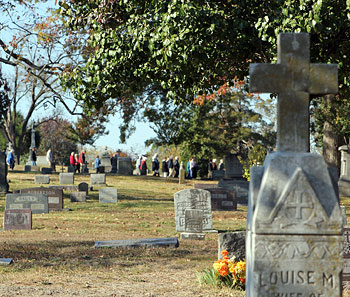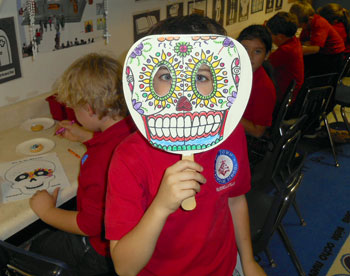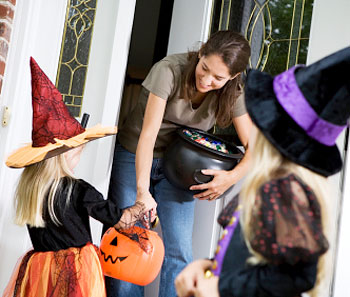Official Website of the
Catholic Diocese of Little Rock
Keep Halloween in line with Catholic truth
Published: October 24, 2017
The American culture seems obsessed with zombies, vampires, ghosts and the occult. It is especially bad this time of year when we are inundated with disturbing images of darkness and death, which is a distortion of what Halloween is really about.
Father Steve Grunow with Word on Fire explains that Halloween, as understood by Catholics, puts the realities violence, horror and death "within the context of Christ’s victory over sin, death and the devil. The current secularized version of the festival has no salvific content and has been loosed from its theological moorings. It looks very much like a festival of death for a culture of death."
All Saints' Day
Halloween or "All Hallows' Eve," is the vigil of All Hallows' Day, now known as the Solemnity of All Saints (All Saints' Day) on Nov. 1. Catholics honor saints who by their example teach us how to live "hallowed" or "holy" lives on All Saints' Day. Arkansas Catholic explains that this feast day is a special time for the Church to remember those who have died and gone to heaven. This includes all saints, not just those who are known to us (those canonized by the Church). Catholic teaching holds that all people in heaven are saints. We ask them to pray for us so that we go to heaven as well. All Saints' Day is a holy day of obligation to attend Mass. To find holy day Mass times in your area, contact a parish near you.
All Souls' Day
 The Commemoration of the Faithful Departed (All Souls' Day) is celebrated on Nov. 2. On this day, we remember and pray for all those who have died that are now in purgatory. Souls in purgatory "have not yet been purified" in order to enter heaven.
The Commemoration of the Faithful Departed (All Souls' Day) is celebrated on Nov. 2. On this day, we remember and pray for all those who have died that are now in purgatory. Souls in purgatory "have not yet been purified" in order to enter heaven.
The Catechism of the Catholic Church ensures us however, that those in purgatory will enter heaven. "All who die in God's grace and friendship, but still imperfectly purified, are indeed assured of their eternal salvation; but after death they undergo purification, so as to achieve the holiness necessary to enter the joy of heaven." (no. 1030)
The Church teaches that our prayers for those in purgatory can help them in their purification. That is why Mass intentions are offered for those who have died throughout the year. On All Souls' Day, many Catholic parishes celebrate Masses, hold special prayer services and adoration times, bless graves, have rosary processions at cemeteries and place the photos of deceased loved ones near the altar in church. To find out how All Souls' Day will be celebrated in your area, contact a parish near you. To learn more about this feast day, read "Why we pray for all souls today" or "20 ways to pray for the holy souls in purgatory."
The annual All Souls' Day Mass at Calvary Cemetery will be celebrated at 9:30 a.m. on Nov. 2. This cemetery is located at the corner of Wright Avenue and South Woodrow Street in Little Rock. The main entrance is off of Charles Bussey Avenue. Get driving directions from your location. After the Mass, there will be a procession through the cemetery praying the rosary and blessing graves. If it rains, the Mass will be celebrated at the Cathedral of St. Andrew in Little Rock at 10 a.m. For more information, contact Dennis Lee (501) 664-0340, ext. 308.
Dia de los Muertos
 In Mexico, the celebration of the Dia de los Muertos (Day of the Dead) combines the religious aspects of All Saints' and All Souls' days with cultural traditions of honoring the dead.
In Mexico, the celebration of the Dia de los Muertos (Day of the Dead) combines the religious aspects of All Saints' and All Souls' days with cultural traditions of honoring the dead.
It is considered a national holiday and is celebrated from midnight Oct. 31 to Nov. 2 with the customs of "building private altars at the tomb of loved ones where families can bring the deceased person’s favorite foods, drinks, flowers and mementos."
A common symbol is the skull, which symbolizes death and rebirth. To learn more, visit Arkansas Catholic or National Geographic.
Catholics and Halloween
Today's secular observance of Halloween varies widely from mere trick-or-treating to using Ouija boards, tarot cards, getting palm readings from psychics, holding séances and many other forms of dabbling in the occult. Catholic teaching is very clear about these practices.
"All forms of divination are to be rejected: recourse to Satan or demons, conjuring up the dead or other practices falsely supposed to 'unveil' the future. Consulting horoscopes, astrology, palm reading, interpretation of omens and lots, the phenomena of clairvoyance, and recourse to mediums all conceal a desire for power over time, history, and, in the last analysis, other human beings, as well as a wish to conciliate hidden powers. They contradict the honor, respect, and loving fear that we owe to God alone." (Catechism of the Catholic Church, no. 2116)
 As a result, some Christians believe Halloween is evil and choose not to celebrate it. So what's a Catholic to do? Should we not carve the pumpkin, dress in costumes and trick-or-treat for candy? Opinions vary but many agree that it is not only ok for Catholics to celebrate Halloween but we should reclaim the customs that have Christian roots, like the jack-o'-lantern and trick-or-treating.
As a result, some Christians believe Halloween is evil and choose not to celebrate it. So what's a Catholic to do? Should we not carve the pumpkin, dress in costumes and trick-or-treat for candy? Opinions vary but many agree that it is not only ok for Catholics to celebrate Halloween but we should reclaim the customs that have Christian roots, like the jack-o'-lantern and trick-or-treating.
Father Grunow encourages Catholics to celebrate Halloween. "Halloween should not be a day when our churches go dark and Christians retreat into the shadows, but when we fill the darkness with Christ's light and go out into the culture, inviting everyone to the prepare for the festival of the saints with all the joy we can muster."
Gretchen Filz in "A Catholic's Guide to Halloween" advises: "To avoid superstition and any negative influence of the occult, Halloween should not be honored or celebrated apart from Catholic truth in the same way we should keep the birth of Christ at the center of Christmas, and the resurrection of Christ at the center of Easter."
"To avoid superstition and any negative influence of the occult, Halloween should not be honored or celebrated apart from Catholic truth in the same way we should keep the birth of Christ at the center of Christmas, and the resurrection of Christ at the center of Easter."
Christina Mead points out in Life Teen International that the evil images associated with Halloween are a reminder to Catholics that the battle over evil has already been won and there is no need to be afraid.
"When we decide to be afraid of the devil we give our power over to him. What message does it send the world if we, as Christians, are afraid to admit to the reality of evil? It sends the message that we’re not sure who wins this battle of good versus evil. ... Partaking in this holiday does not mean you’re opening yourself up to evil. I think that on the contrary, it means you’re claiming as your own the victory of Christ on the cross. How much more Christian can you get?"
Christopher West agrees. "This Halloween, like every other, signs of death will come out to haunt us. Fear not. When the sun comes up the next morning, we have the witness of all the saints proclaiming: 'Death is not the final word on human life. The final word is resurrection ...'"
For questions not covered in this article, check out Our Sunday Visitor's "Media Matters Webcast with Teresa Tomeo Ghouls, Goblins, or God?" Wednesday, Oct. 25 at 10 a.m. It will include a Q&A session. Busted Halo offers ways to make Halloween educational and fun with its: "Five Saints to Help You Celebrate Halloween" and "Seven Ways to Keep the 'Hallow' in Halloween."
Related articles include: Word on Fire's "It's Time for Catholics to Embrace Halloween" and "10 Most Haunted Catholic Sites In America," "Should Catholics Believe in Ghosts?" from UCatholic, "Ghosts and the Catholic Church: Pointing to the Permanence of the Soul," from National Catholic Register and "What the Hell Is Halloween and How It Can Point You to Heaven," by Christopher West.




